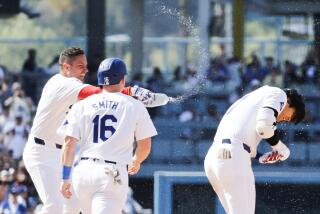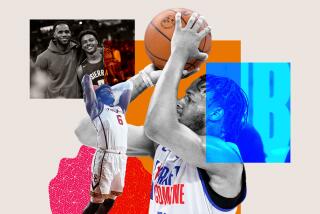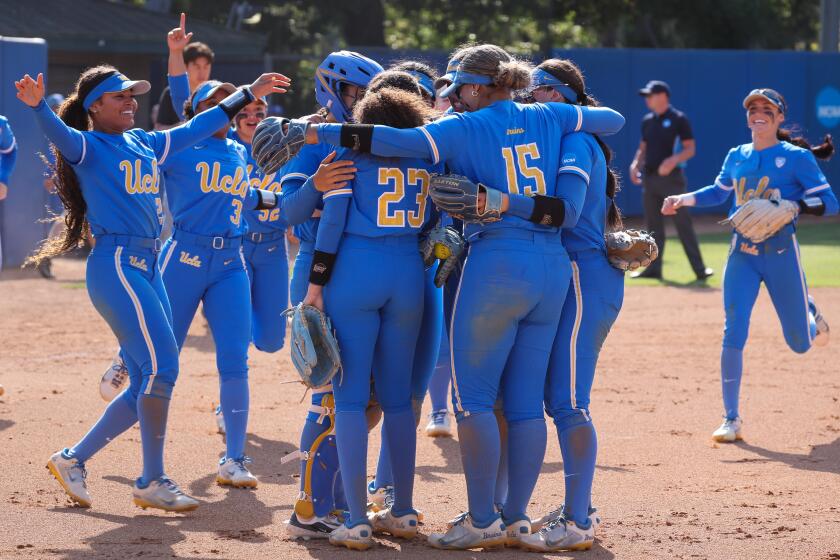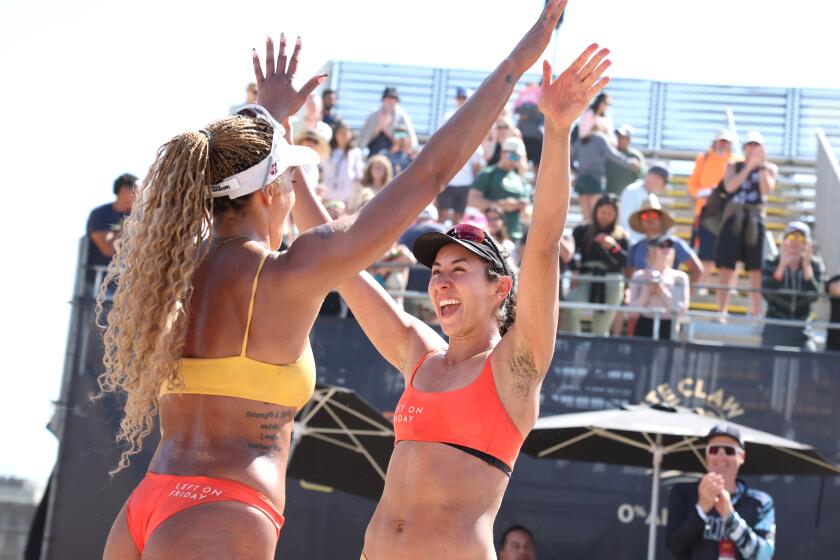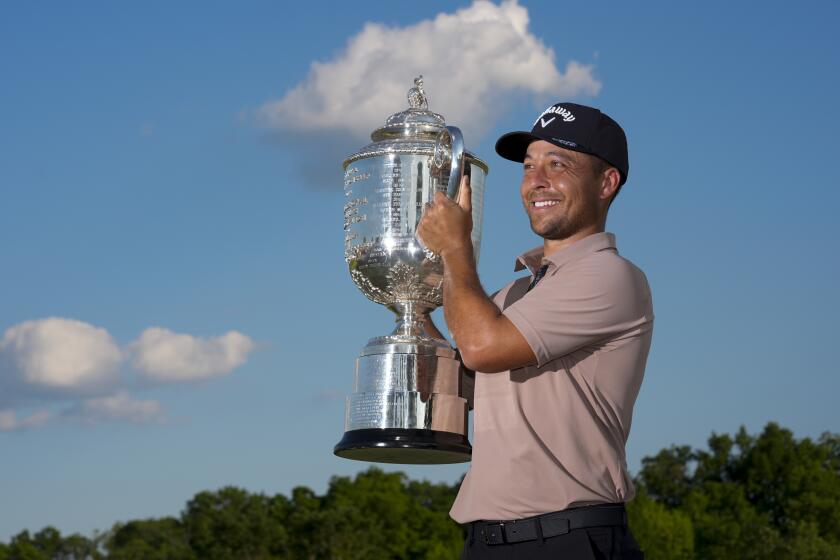Testing the Waters : Ways Are Sought to Give Undergraduates a Chance to Determine Their Value as Professionals Before They Give Up Their College Eligibility
Braxston Banks had always dreamed of a job in professional football. But not like this.
Not sitting at a desk, going near a field only to talk with NFL players instead of dragging them along for extra yardage.
Banks, 6 feet 3 and 215 pounds, dreamed of becoming a bruising NFL fullback before scouts armed with stopwatches and harsh opinions decided he wasn’t good enough.
The Supreme Court wasn’t much help, either.
So the former Notre Dame athlete turned to his own version of Plan B. He graduated from college and accepted a job with the NFL Players Assn. as an assistant to Gene Upshaw, executive director.
Banks acknowledges he would much rather have one of those Sunday jobs, the kind that pays big money for moving the football a short distance.
“But at least I (have) my degree and I can move on,” said Banks, 25. “Life goes on. I’m going on. I’ll be OK.”
Still, there are regrets, decisions that Banks and others will always second-guess.
Specifically, his 1990 decision to declare for the NFL draft.
He immediately lost his NCAA eligibility, then went undrafted when scouts said he was too slow. Notre Dame could have pulled his scholarship for his final semester but didn’t, although that policy varies from school to school.
Banks filed a lawsuit against the NCAA to regain his eligibility, claiming a violation of antitrust laws. It was thrown out.
He tried to get the Supreme Court to hear his case. In May, it said it wouldn’t.
And so the football dream ended unfulfilled, with lingering regrets, a feeling of emptiness and a useless pair of cleats.
Ron Maestri, University of New Orleans athletic director, knows the Braxston Banks story chapter and verse. He even added to it.
“Lou Holtz (Notre Dame coach), didn’t know whether he was going to have (Banks) for his senior year,” Maestri said. “It really left the institution, the coach and everyone up in the air.”
Maestri also knows about Brad Gaines and Octavius Gould, two other successful college players who left school early, only to go undrafted.
And he’s familiar with former Nevada Las Vegas guard Anderson Hunt, who declared for the 1991 NBA draft, then was bypassed.
In the last four years, more than 46%--76 of 165--of athletes declaring early for the NFL draft have gone undrafted, though many marginal players have put their names in as a joke.
Sixty-seven of 184 undergraduates (36%) have gone undrafted in the NBA since 1976, showing that Hunt is not an anomaly.
For every Drew Bledsoe or Chris Webber, there is a Banks or Hunt, an athlete serious about his pro chances who fails to get drafted and is unable to return to school on scholarship.
That is why Maestri is so concerned.
“We feel (the decision to turn pro) is very important for the student-athlete,” said Maestri, a former college baseball coach. “We want to make sure that we can protect them.”
Maestri, chairman of the NCAA’s Professional Sports Liaison Committee, said that an athlete’s declaration for a draft should not end his eligibility.
With that in mind, the liaison committee will meet Monday in Kansas City, Mo., to complete a proposal that--if passed at an NCAA convention--would give the next generation of college athletes new options.
In football, the proposal would permit athletes to declare for the draft, assess their worth by contacting various teams, then back out if they decide that their draft prospects are poor.
“Before, once you applied for a draft, you were dead,” Maestri said.
A basketball player would enjoy even more latitude. He could declare for the NBA draft and still return to school on scholarship if he was dissatisfied with the result, using what Maestri called a “window of opportunity.”
“It’s a dramatic proposal,” Maestri said. “This gives kids the opportunity to test their worth. It might take some pressure off a kid (and) give them a period of time where they can test the waters.”
The so-called test-the-waters issue has been talked about before, but the NCAA rule has remained: Once a player declares for a draft in basketball or football, he immediately relinquishes
college eligibility in that sport.
As Banks’ former attorney, Alan Morrison, put it: “You put your foot in the water, and your foot gets burned off.”
Morrison, who argued Banks’ case pro bono , said that NCAA rules “force most of the kids to stay in school, which is obviously in (the NCAA’s) best interest.”
The liaison committee’s proposal would change the rules.
The committee supported a 1990 rule change--known then as Proposal 47--that would have allowed college baseball and hockey players more latitude to negotiate with professional organizations.
Last year, the committee recommended legislation giving NCAA institutions more leeway in paying an athlete’s medical expenses.
The current proposal--if passed it would cover all 895 NCAA institutions--includes the following stipulations:
--Athletes declaring for the NFL draft in, say, January, would be permitted to retain college eligibility--should they change their minds--provided they submit a letter to their school’s athletic director at least seven days before national letter-of-intent signing day in early February. The draft is usually held in late April.
That would give coaches more control over scholarships and roster sizes, Maestri said.
--Basketball players would have 30 days to return to school and retain their eligibility after the NBA draft in June.
--College athletes could use the rule only once during their eligibility.
--Athletes hiring agents would be ineligible and would not be permitted to return to school on athletic scholarships.
--The proposal would not affect college baseball and hockey players, who don’t declare for drafts.
These conditions have helped convince a growing number of college coaches and athletic directors that this “test-the-waters” proposal is beneficial to college athletics. In the past, similar proposals have been met with fierce opposition.
“It would give players an option,” said Jim Harrick, UCLA basketball coach. “Take a player like (former UCLA forward) Tracy Murray. He thought he was going to go in the lottery. He went 18th. Maybe he would have returned to school if he had had the chance.
“This sounds like a very favorable deal (for everyone).”
Said Gene Keady, Purdue basketball coach: “It’s maybe a little more hardship on Division I coaches, but most coaches would like that better than not getting (a player) back at all.”
Dick Schultz, NCAA executive director, and Don James, University of Washington football coach, endorse the idea.
“Let a player find out his worth, then he can make his decision,” said Schultz, who resigned in May but is working until a replacement is named.
When Eugene Burkhalter of Washington, a junior free safety, declared but went undrafted in 1990, James said that the next time that happened, he would stand up for the player.
“We’ll take him back, if he wants to come back, and challenge that rule,” James said.
James apparently couldn’t wait. He joined the 10-member liaison committee in 1991, hoping to help shape a rule change.
Boston sports attorney Bob Woolf is another proponent. He said the proposal might help athletes who have received poor advice from sports agents.
“It looks like an awful lot of youngsters are getting bad information,” he said. “I think it’s very common, where an agent either has wrong information or is not being honest.”
Added Maestri: “It might take some of the agents out of this.”
Nevertheless, getting the proposal passed is expected to be difficult.
First, it must be approved in early August by the 46-member NCAA Council, which rejected a different test-the-waters proposal last year.
Then, it must be passed by a two-thirds majority of the NCAA’s membership at the January Convention in San Antonio.
All of this comes amid a chorus of opposition from the professional leagues.
“We’re opposed to the idea,” said Greg Aiello, NFL director of communications. “We think the players should stay in school to get their degree.”
But neither the NFL nor the NFLPA is waiting for the NCAA to enact legislation.
Their 1993 collective bargaining agreement includes a provision for athletes who return to college after they are drafted.
According to the agreement, the drafting team retains its rights to such athletes until the draft that is held after their eligibility ends. That team also has exclusive rights to redraft such athletes with its first pick once they complete their eligibility.
Upshaw said that he and Commissioner Paul Tagliabue have discussed the issue and included provisions in the agreement to “fix something that has been bleeding and hemorrhaging.”
Still, Upshaw said that, with a few exceptions, athletes benefit by staying in school.
“But we can’t prohibit a guy from coming into the league,” Upshaw said. “We understand the risk of injury in (college).”
A rookie wage scale--which will be in place for the next seven years--might help persuade athletes to stay in school, he said.
“They’ll have a longer career and will make more money if they get their degree,” Upshaw said.
NFL officials hope the agreement’s provisions are unnecessary.
The league plans to set up a six-person advisory board that would give college athletes a rough idea of where they might be drafted, in lieu of test-the-waters legislation.
Under a plan favored by Tagliabue, the panel would be made up of evaluators from the top scouting services. NFL officials say the panel could be in place by 1994.
All of this is a little late for Braxston Banks.
He hopes to help others avoid the mistakes he has made.
“I would still like to see the system changed for those who go down the same I road I have gone down,” he said. “You have a lot of guys leaving early who don’t have a college degree.
“The only thing I’d like to ask the NCAA--are they going to actually pass it this time?”
The Proposal
Key elements of an NCAA proposal to allow athletes to retain college eligibility after declaring for pro football or basketball drafts.
* Athletes declaring for the NFL draft in, say, January, would be permitted to retain college eligibility--should they change their minds--provided they submit a letter to their school’s athletic director at least seven days before national letter-of-intent signing day in early February. The draft is usually held in late April.
* Basketball players would have 30 days to return to school and retain their eligibility after the NBA draft in June.
* College athletes could use the rule only once during their eligibility.
* Athletes hiring agents would be ineligible and would not be permitted to return to school on athletic scholarships.
* The proposal would not affect college baseball and hockey players, who don’t declare for drafts.
More to Read
Get our high school sports newsletter
Prep Rally is devoted to the SoCal high school sports experience, bringing you scores, stories and a behind-the-scenes look at what makes prep sports so popular.
You may occasionally receive promotional content from the Los Angeles Times.

